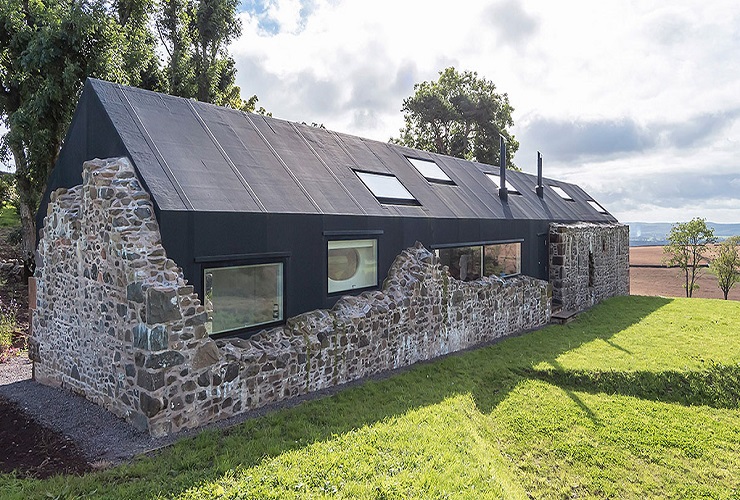In an more and more globalized international, a growing number of persons are looking to escape the noise of metropolitan lifestyles. The desire to live closer to nature, decrease the carbon footprint, and achieve the dream of living off the grid caused people to think about off-grid living. A lifestyle of off-grid homes means freedom and being sustainable, at least that is the idea and the hope. In this ultimate guide, we shall discuss aspects related to off grid homes for sale including the pros, cons as well as other factors which people should consider when going off grid.
What Are Off-Grid Homes?
Off-grid homes are designed to function independently of public utilities. This manner they’re no longer connected to the electric grid, municipal water deliver, or sewage gadget. Instead, those homes rely on renewable energy resources, consisting of solar or wind power, and often incorporate structures for water series and waste control.
Key Features of Off-Grid Homes
- Renewable Energy Sources: Solar panels and wind generators are usually used to generate power.
- Water Management: Rainwater harvesting structures and well water are regular assets.
- Waste Management: Composting lavatories and septic structures control waste.
- Energy Efficiency: These homes are frequently designed with power-efficient home equipment and insulation to reduce energy intake.
Why Choose an Off-Grid Home?
1. Environmental Benefits
Staying off-grid is a way of cutting on the use of carbon since one does not depend on utilities like electricity. Hence, by counting on renewable energy assets you may reduce your reliance on fossil energy sources that may be one of the biggest culprits for global warming. Besides, off-grid homes may also promote better firsthand practice of sustainable living standard that includes recycling and composting.
2. Financial Independence
While the preliminary investment in an off-grid home can be good sized, the lengthy-term financial savings are massive. Without month-to-month application payments, homeowners can keep heaps of bucks each year. Over time, the savings can offset the preliminary charges. And also, making off-grid residing a financially possible alternative.
3. Self-Sufficiency
One of the primary appeals of off-grid residing is the sense of independence it presents. Being able to generate your own energy, gather your own water. And also, control your own waste systems method you’re much less reliant on external services. This can be mainly attractive in times of crisis or herbal disasters whilst public utilities may be disrupted.
4. Connection to Nature
Off-grid homes are often located in faraway, scenic areas, presenting a closer connection to nature. This lifestyle can result in advanced intellectual and bodily well-being. Because it encourages out of doors sports and a slower tempo of existence.
Challenges of Off-Grid Living
While off-grid residing offers severa benefits, it isn’t without its challenges. Potential owners ought to cautiously consider these factors earlier than making the transition.
- Initial Costs: The value of putting in place an off-grid home can be good sized. Solar panels, wind turbines, battery storage systems, and water control systems require a considerable prematurely investment. However, there are often offers and incentives to be had to help offset those fees.
- Maintenance: Maintaining an off-grid home requires a positive level of technical understanding and dedication. Solar panels need ordinary cleaning, batteries need to be monitored, and water structures require maintenance. Homeowners need to be prepared to perform or arrange for everyday maintenance.
- Lifestyle Adjustments: Living off-grid often means making way of life adjustments. Energy and water conservation end up important practices. However, this would possibly imply shorter showers, much less use of electrical appliances, and a more cognizance on sustainability in daily lifestyles.
- Location: Off-grid homes are usually located in rural or remote regions. While this offers peace and quietness, it can also suggest constrained get admission to to facilities and offerings. Prospective owners need to consider their proximity to healthcare, schooling. And also, employment possibilities.
Finding off grid homes for sale
The market for off-grid homes is developing, with greater homes turning into to be had as hobby in sustainable residing increases.
Here are some suggestions for locating the right off grid homes for sale:
Real Estate Websites
Many real property websites now feature sections devoted to off-grid homes. Websites like Zillow, Realtor.Com, and specialised websites like offgridworld.com listing homes which might be designed for off-grid dwelling. Using seek filters to specify off-grid features can help slender down the alternatives.
Off-Grid Communities
Joining off-grid groups, both online and in-character, can offer precious resources and connections. These communities regularly have listings of residences on the market and may offer firsthand insights into off-grid residing. Websites like Off-Grid.Net and various Facebook businesses are terrific locations to start.
Real Estate Agents
Working with a actual estate agent who makes a speciality of off-grid residences may be highly useful. However, they can provide professional advice, help you navigate the shopping for process, and perceive homes that meet your unique needs.
Auctions and Classifieds
Local auctions and classified ads, both on line and in print, can once in a while characteristic off-grid homes. This can be a greater lower priced way to find a belongings, although it is able to require greater legwork and due diligence.
Key Considerations When Buying an Off-Grid Home
- Energy Systems: Ensure that the strength structures in place are enough to your needs. Consider the type and wide variety of solar panels, wind generators, and battery garage. It’s additionally important to apprehend the upkeep necessities and lifespan of those systems.
- Water Supply: Evaluate the water sources to be had. Check the capability and reliability of rainwater harvesting systems, wells, or different water assets. Also, check the water filtration and purification structures to make sure secure drinking water.
- Waste Management: Understand the waste control systems, which includes septic structures and composting bathrooms. Make sure they’re properly maintained and comply with nearby rules.
- Location and Access: Consider the vicinity’s proximity to essential offerings, inclusive of hospitals, faculties, and grocery stores. Also, examine the accessibility of the assets, particularly in terms of avenue conditions and weather-related demanding situations.
- Legal and Zoning Issues: Ensure that the belongings complies with neighborhood zoning legal guidelines and building codes. Some regions have regulations on off-grid structures, so it’s vital to verify that each one installations are legal and authorized.
- Community and Support: Living off-grid may be setting apart, so it’s beneficial to have a assist network. Check if there are close by groups or acquaintances who proportion your way of life and can offer help or companionship.
Popular Locations for Off-Grid Living
The United States
The U.S. Gives a huge sort of locations for off-grid dwelling. States like Colorado, Montana, and Vermont are popular because of their good sized open areas, herbal splendor, and supportive policies for off-grid structures. However, the desolate tract regions of Arizona and New Mexico also are favored for their considerable sunshine, perfect for solar energy.
Canada
Canada’s sizable desolate tract regions provide enough opportunities for off-grid residing. Provinces like British Columbia and Ontario are acknowledged for their beautiful landscapes and supportive off-grid communities. The colder weather can pose demanding situations, but improvements in era make it increasingly feasible.
Australia
Australia’s various weather and panorama make it an attractive alternative for off-grid residing. Regions like Queensland and Tasmania provide lush, fertile land, while the Outback gives a remote, rugged environment for the ones in search of solitude.
Europe
Countries like Sweden, Norway, and Scotland are gaining popularity for off-grid residing. These regions offer beautiful herbal splendor, supportive communities. And also, authorities incentives for renewable electricity use. The mission of less warm climates is offset by means of the excessive first-rate of lifestyles and robust infrastructure.
The Future of Off-Grid Living
The future of off-grid residing appears promising, with advances in generation making it extra handy and sustainable. Innovations in solar and wind power, battery storage, and water purification structures are usually improving the feasibility and comfort of off-grid homes. Additionally, growing recognition and problem for environmental issues are using more people to keep in mind off-grid living as a feasible lifestyle choice.
Technological Advancements
- Improved Solar Panels: New developments in sun technology are making panels extra green and low-cost.
- Energy Storage: Advances in battery technology, inclusive of Tesla’s Powerwall, are improving energy storage abilities.
- Water Purification: Innovations in water filtration and purification are supplying safer. And also, extra dependable water sources.
- Smart Home Technology: Integration of smart domestic structures lets in for higher electricity control and monitoring.
Government Support and Incentives
Governments round the sector are recognizing the benefits of off-grid residing and are providing incentives to aid it. This includes tax credit for renewable strength installations, grants for sustainable building practices. And also, relaxed regulations for off-grid structures.
Learn More: 80s Christmas Decorations: A Nostalgic Journey
Frequently Asked Questions (FAQs)
- Can you legally live off-grid in the UK?
Yes, it is legal to live off-grid in the UK. However, there are regulations regarding planning permissions, waste disposal, and building regulations that must be considered.
- How many people in the UK live off-grid?
Exact numbers are difficult to pinpoint, but it’s estimated that thousands of people in the UK live off-grid, either partially or fully, embracing sustainable lifestyles away from traditional utilities.
- Can you live off-grid in Spain?
Yes, it is possible to live off-grid in Spain. However, many rural areas and properties offer opportunities for off-grid living, allowing residents to be self-sufficient in terms of energy and water.
Summing Up
Off grid homes for sale offers a unique opportunity to embrace sustainable living while enjoying independence from conventional utilities. These homes provide the chance to live in harmony with nature, reduce your carbon footprint, and foster a self-sufficient lifestyle. Whether you’re looking for a peaceful retreat or a permanent residence, off-grid living can be incredibly rewarding. Imagine waking up to the serene sounds of nature, knowing you’re making a positive impact on the environment. Investing in an off-grid home is not just a purchase; it’s a commitment to a more sustainable and fulfilling way of life.
Don’t Miss: Decorative metal stand crossword clue 7 letters




Pingback: Homes for Sale in Omagh: Your Ultimate Guide to Finding Your Dream Home - home decor ideas24
anabolic steroids uk
References:
reyes-cervantes-3.blogbright.net
References:
Pink floyd live in pompeii
References:
https://forum.dsapinstitute.org/forums/users/polooxygen46
References:
Slot tamashebi
References:
https://lockfiber15.werite.net
Your article helped me a lot, is there any more related content? Thanks!
References:
Gran casino barcelona
References:
https://ccsakura.jp:443/index.php?knightcrayon2
References:
Casinos rochester
References:
pallesen-holman-2.thoughtlanes.net
excellent points altogether, you just gained a new reader. What might you recommend about your submit that you just made some days in the past? Any sure?
legal muscle builders
References:
https://bookmarkspot.win/
Thank you for your sharing. I am worried that I lack creative ideas. It is your article that makes me full of hope. Thank you. But, I have a question, can you help me? https://accounts.binance.com/fr/register-person?ref=T7KCZASX
steroids emotional side effects
References:
clashofcryptos.trade
steroid side effects long term
References:
stroyrem-master.ru
vitamins to take while on prednisone
References:
http://jobs.emiogp.com/author/sheetarcher2
References:
Valley view casino center
References:
riise-frisk-3.federatedjournals.com
References:
Schecter blackjack sls c 8
References:
https://www.hulkshare.com/jamesrhythm8/
References:
Konami slot machines
References:
http://techou.jp/
References:
Fantasy springs casino
References:
https://www.google.pl
References:
Celine dion in las vegas
References:
https://onlinevetjobs.com
References:
Quebec roulette
References:
https://pad.stuve.de/
References:
Florida casinos
References:
https://saveyoursite.date/
References:
Santa ysabel casino
References:
dokuwiki.stream
References:
Oaks casino towers
References:
donaldson-graversen-2.hubstack.net
References:
Slot machine apk
References:
https://copyformat93.werite.net/payid-deposits-and-withdrawals-at-australian-online-casinos
References:
Casablanca casino
References:
https://nhadat24.org/author/recessred82
I don’t think the title of your article matches the content lol. Just kidding, mainly because I had some doubts after reading the article. https://www.binance.info/es/register?ref=RQUR4BEO
legal safe steroids
References:
http://karayaz.ru/
I don’t think the title of your article matches the content lol. Just kidding, mainly because I had some doubts after reading the article. https://accounts.binance.info/en-ZA/register?ref=B4EPR6J0
References:
Play online roulette
References:
https://dreevoo.com/profile.php?pid=1035912
I visited a lot of website but I believe this one contains something special in it in it
anabolic enhancer supplements
References:
bookmarkspot.win
trenbolone alternative
References:
https://bookmarking.win/story.php?title=buy-clenbuterol-legally-online-from-a-verified-supplier-london-uk
steroids vs natural pictures
References:
https://elearnportal.science/wiki/8_Natural_Appetite_Suppressants_for_Weight_Management
steroids legal in mexico
References:
https://humanlove.stream
decca steroids for sale
References:
sciencewiki.science
trenorol bodybuilding forum
References:
menwiki.men
fantastic post, very informative. I wonder why the other experts of this sector don’t notice this. You must continue your writing. I am confident, you’ve a huge readers’ base already!